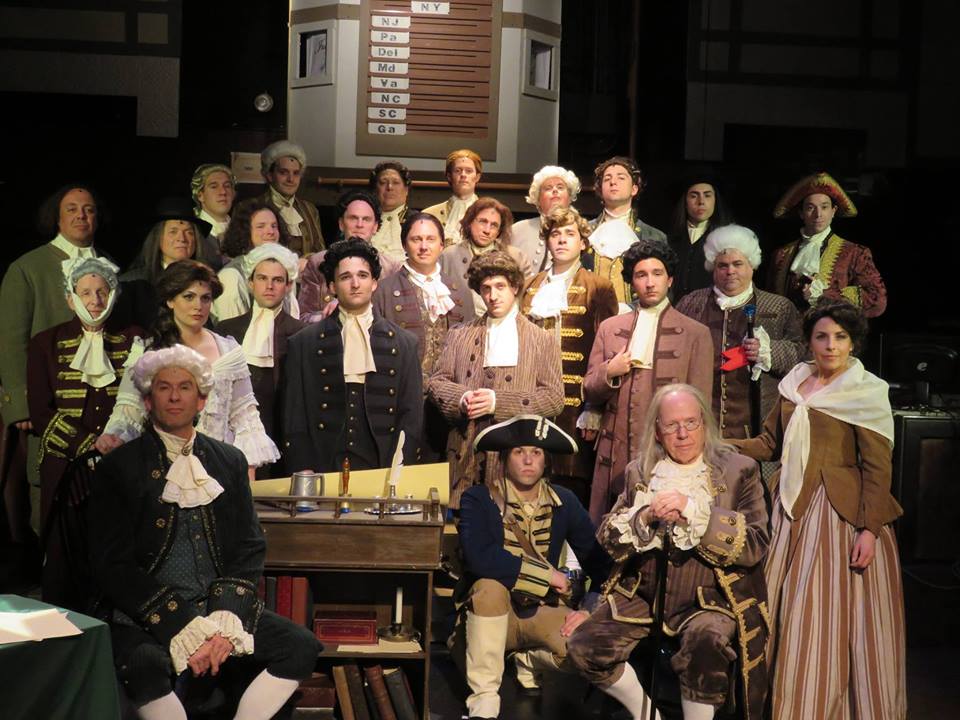Crossing the line from nay to yea in the vote for independence is more than just having Congressional Custodian Andrew McNair slide a tally marker from one side of the board to the other. Continuing on in the interview series Vote Yes: Inside Independence Hall, TheatreBloom investigates the fence-sitting, decision-making members of congress— Samuel Chase of Maryland and Judge James Wilson of Pennsylvania— as played by Toby’s veteran performer Andrew Horn and Toby’s newcomer Scott Harrison, respectively in the current Toby’s Dinner Theatre production of 1776.
If you fellas would be so kind as to introduce yourselves and give our readers an idea of where they’ve seen you in the Washington DC theatrical area in the last year or so, we’ll head right into it from there.
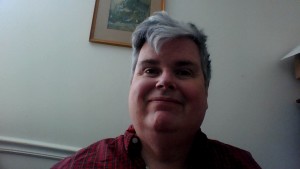
Andrew Horn: I’m Andrew Horn and I play Samuel Chase in the show, who is the delegate from Maryland. I’ve been working in the area for over 30 years, and at Toby’s since 1988. My first show at Toby’s was The Mystery of Edwin Drood where I played Bazzard. I’ve been working here on and off ever since. I also worked at The Harlequin when it was around, Petrucci’s when it was around, I’ve worked at Olney, and I did the national tour of the Toby’s version of It’s A Wonderful Life about 20 years ago. The last thing I did on the Toby’s stage was Les Miserables where I played the bishop. Since then other things have happened in my life but I’m happy to be back and working again.
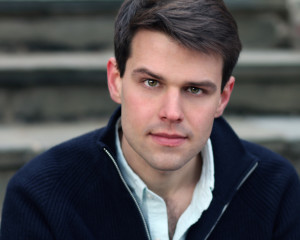
Scott Harrison: I’m Scott Harrison and I play Judge James Wilson of Pennsylvania. This is my first show at Toby’s and I’m very excited to be here. The last show I did was Fiddler on the Roof at Arena Stage, in which I played Mendel, the Rabbi’s son. I grew a big beard for that role and, now that I’m clean-shaven, I have to reintroduce myself to just about everyone I met during Fiddler, because nobody recognizes me.
In the last year I did Into the Woods at Next Stop Theatre Company down in Virginia and I also did their summer children’s show where I played a delivery turtle and a dancing spider. It was a lot of fun. The show was called Good Good Turtle on Bad Bad Island and was directed by Danny Tippet, who is one of our swings in 1776. And if we go just over a year, I played Enjolras in Les Miserables at Reston Community players last January.
What was the general appeal to come and want to be a part of 1776?
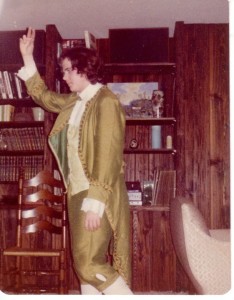
Andrew: 1776 was the first show that I did that was a real show when I was in school. Well, it wasn’t really when I was in school. I was living in Bedford, New York— there isn’t actually a Bedford Falls but there is a Bedford Hills— and there was a summer theatre group called The New Youth Performing Theatre. In the summers they did shows with high school and middle school students. They were doing 1776 when I was 15 years old and I played John Dickinson. I loved it. And I’ve wanted to do this show again ever since and I’ve never had the opportunity. But here it is. So it was so great to be able to finally do it again!
Scott: I’ve never been in 1776 before, but have always loved learning about the revolutionary war era and have seen and enjoyed several productions of the show, so it’s been on my list for a while. On top of that, I have friends who have worked at Toby’s and had been hoping to get the chance to work here, so a show like 1776 where they needed a lot of men seemed like a good opportunity!
Can you talk to us a little bit about how you guys are similar to or different from the characters that you are portraying? What your personal ties or relatability to the characters might be?
Andrew: A lot of people think I’m from Maryland, but actually I was born in California. I moved to New York when I was 14 and then moved to this area when I was 20 or 21, somewhere around that age. But I’ve lived in Maryland most of my life now, so it’s an exciting thing to get to play the representative from here. It’s very interesting because I didn’t know a whole lot about Chase, you know, other than what I remembered from the show. It’s really interesting to me how he’s different in real life than the way he is portrayed on stage. In real life he was much more for independence but he wasn’t allowed to vote for it until he had changed the minds of the Maryland assembly. He was very much a rabble-rouser-or, as John Dickenson would say, an “a-gi-ta-tor.”
It’s funny, I think he was very much like John Adams in some ways in real life. He led demonstrationsagainst the Stamp Act and he was one of the founders of The Sons of Liberty in Maryland. He was always sort of a social climber. He lived in debt most of his whole life, which he got from his father who was a minister, who was assigned to a rather ritzy parish in Annapolis, and always tried to live like his parishioners- on a considerably lower salary!. There is an incredibly split opinion of him among the people who knew him. There were people who absolutely loved him and then there were people who would initially like him and then say, “no. He’s the most obnoxious man I’ve ever met; no one could ever like this man.”
In terms of being like or not like him, it’s easy to joke that I’m disliked, but honestly I think I’ve evolved in the way that people know me. For a long time I really was the guy that people would say, “Oh yeah, Andrew, he’s great.” But then I started expressing my opinions, and some people didn’t take kindly to that.. I don’t think there are people who would say I’m the worst person in the world, but there are people who say “He gets upset about stuff.” And I do.
Scott: As far as I know we all like Andrew.
Andrew: See? As far as I know I don’t think I’m obnoxious and disliked. But I do think that there are people who would say “he gets a little too passionate about wanting things to be right.” Sometimes I have to understand that not everybody is at the same place as I am, especially during rehearsal periods of shows. I used to be much worse about it, but now I’ve learned to hold my tongue. I’ve learned that everyone has their process and that their process is not mine. And sometimes I have to remind myself of that. I’m passionate, but not a rabble-rouser.
Scott: So, me and Judge James Wilson…as you know, he’s a bit of a wimp in the show. I don’t think I’m a wimp, haha, but the guys in the cast do keep joking that I’m exactly like Judge Wilson, mostly teasing me because I can be indecisive (especially when we’re trying to decide where to eat between shows…). More seriously, I’m a people pleaser and I think that’s a lot of what his situation was in real life and also in the play. The book writers did him a little bit of a disservice—he was not as wishy-washy and not as much of a push-over as they made him out to be. But the way they changed him did work for the narrative very well. He was actually polling his constituents, which was why he was a late “yes” vote.
I’m a people pleaser and I can be indecisive on occasion, but he’s a fun character. It’s not a type of character that I generally play so I’m really enjoying the opportunity. Unfortunately I don’t have any real connection to the great state of Pennsylvania the way Andrew does with Maryland.
You two both sound like musical theatre men. So how is this different from the musical work that you guys have done previously and what is it like performing as a part of a play with music?
Andrew: It is a challenge. Most of the time you have a musical moment for all of your biggest emotions. Here your biggest emotions are not in that musical number. The only songthat our characters end up doing is the opening number, “Sit Down, John.” So from that point on as far as we’re concerned it’s a straight play. We cut “Cool Considerate Men” which is usually the other group number but Chase isn’t in that number either. For me, I treat this show as a straight play. I haven’t done a lot of those in my career. I’ve found that it’s actually not as different as I would have thought. I think I’ve always tried to approach musicals as an actor. I started out thinking of myself as an actor, I didn’t really think I was a musical theatre actor, but I got into musical theatre right away and that’s where a lot of the jobs are. I didn’t find my process having to change at all for this. In this show you’re sitting there for a long time and you’re reacting. That’s the biggest challenge for me. Now the only way that differs from the musicals that I do is that usually there would be a song breaking up those long stretches and that I would be singing something in there somewhere even if I’m just in the ensemble or doing backup vocals for a number.
You could see where that could have happened in scene three. If they had decided to musicalize that scene, most of us would have been sitting there adding harmony. But instead you get to keep your complete character going through rather than having to decide “okay, now how do I justify singing or dancing or moving in rhythm at this moment with my character?” You can compare this to Les Miserables where everything is sung so the challenge is trying to find how to do all of your acting beats within those notes and those music beats without losing who your character is or losing the musicality of it. So this show is a challenge, but in a different sense.
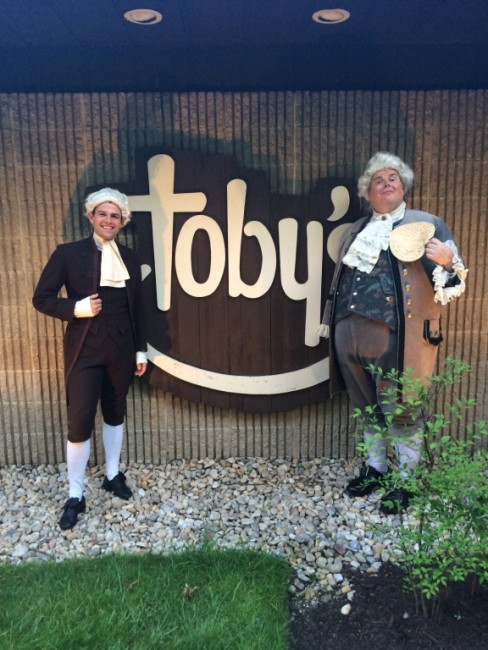
We did a lot of research at the beginning of the rehearsal process of this show, more so than we would normally do for a show at Toby’s, but a lot of that is because we’re playing actual people. You know, these are real men from history, and that’s a very different thing. Like when I did Titanic, I played Etches (Henry Etches, 1st Class Steward) and he was a real human being but we don’t know a whole lot about him and what we do know about him doesn’t completely jive with what’s in the show so in that case it was more of a blank canvas— create the guy they wrote. This is different because this is having to take who he was in real life, recreating him and then trying to stretch him into the confines of the way he’s written into the show.
Scott: It’s a fun challenge to come from solid musicals where most of what you’re doing involves singing to this show where most of what you’re doing is active listening and reacting. We are sitting on stage for almost the entire show. The great and horrible thing about being in the round is that someone can always see you and they can see all of you. We came up with the term “Backting” during Fiddler—you need to be aware of the story your whole body is telling, including your back, because someone in that audience is going to notice it (and some portion of the house is starting directly at it). Whatever you do needs to be intentional.
I’ve done a couple of other shows where the role itself is more of a “straight play-role” than the musical the role is in. For example, I’ve played Cliff in Cabaret. He’s basically in a play, where Sally’s in a musical. It’s a fun challenge to bridge the two and make both of those roles meet.
Since you’ve brought up some of the challenges, what was the biggest challenge or the one that you struggled with the most in taking on your respective roles?
Andrew: For me, part of it is that we did do that research like I said, and Samuel Chase was just much more of a revolutionary than he is portrayed. He was much more in favor of revolution and independence than the way they have him written. I was able to find— and Jeremy and Shawn (Co-Directors Jeremy Scott Blaustein and Shawn Kettering) certainly helped with this— that idea of Chase being for independence but seeing it the way he sees it, that if we can’t win then what’s the point of doing it? He’s very much in favor of independence but only if he knows that they’re going to win the fight out on the battlefield to get them there. So finding the passion in that really helped me find focus in Chase. He was considered by some people to be a very obnoxious person, and taking in all of that and the fact that he is very confident in what he believes was a challenge. Because that very first moment that he steps up ? He takes stage.
He wants the focus on him. His thought process is basically “Everyone listen to me now. We can’t win. If you can assure me that we can win then that’s fine. But until then why are we bothering to declare ourselves independent?” Having that thought process really helped a lot in reconciling the reality of the person with who they wrote for the show. I mean it was necessary to write him that way, they couldn’t have everybody be a fireball. You can’t have everyone spouting off passionately or they take away from John Adams. That’s why Samuel Adams isn’t even in the show; he would easily overshadow John Adams because he was even more of a fireball.
Scott: I similarly had to basically jettison the historical character; he was a passionate political writer. Ironically, McKean has this crazy thick Scottish accent in the show, but was actually born in America his , whereas Wilson moved from Scotland just ten years prior, had grown up there and yet has no accent whatsoever in the show. Now, Dickinson (John Dickinson, played by Darren McDonnell) was actually Wilson’s mentor and his teacher in law so there was that relationship, historically, and I think that dynamic did play out to a certain extent in congress, with Wilson not wanting to needlessly step on his mentor’s toes or undermine him. Otherwise, though, I basically had to let go of most of history to get on board with the Judge Wilson of the show. As a side note: Darren has been a great guy to sit next to at the table–we have a lot of fun. I mean everybody’s been great, but I wanted to mention that because their characters did have that little connection.
The bigger thing for me is that Wilson had been this weird combination in the script of total pushover in the end of the show, bowing to peer-pressure on the one hand, contrasted with the fact that he also speaks up and makes all of these “judge-ly”, wise, stronger sounding statements throughout other parts of the play. Despite this, he’s mostly under Dickinson’s thumb the whole time. It was a bit of a challenge to pull these different aspects together for a consistent arc. Jeremy and Shawn and I worked together to bring in a social anxiety to make him not comfortable when he’s on the spot, but comfortable in when he has to function like a judge; since that’s what he does and that’s what he knows how to do, he’s okay with that.
You both mentioned the historical iconicism of these characters. What are you doing to bring yourselves, Andrew and Scott, to these character portrayals while staying within the confines of history and what’s written in the story?
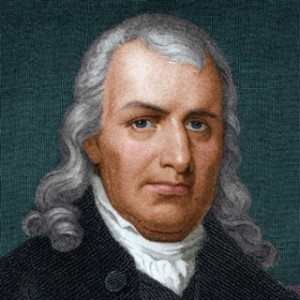
Andrew: It’s funny, I took all sorts of different acting classes early in life. I have so many different styles of acting in my head. Sometimes I don’t really believe in that whole “you have to bring yourself into the character” concept. I mean I know it’s there but I don’t consciously think “what have I gone through that is similar to this?” I’m not method at all in terms of acting. Instead I just try to find the truth in what’s going on and that’s the most important thing you can do. The truth is the truth that you have, you’re not going to think “this is what this guy thinks so that’s how I’m going to act” because I think that leads to bad acting. For me, what came to Chase was the passion that I was talking about before, but when I’m sitting on stage I actively think “what do I think of this guy? What do I think of this other guy?” And even though I make sure it’s all coming from Chase, it’s also all coming from me.
The initial thought was “well, Chase is anti-independence so I should be agreeing with everyone who is anti-independence.” And then I started really listening to what they were saying and Dickinson keeps pissing me off as Chase. He’s all about reconciliation with England, while Chase actually agrees with Adams that the colonies should be independent, and that England has mistreated us. But he also thinks both of them don’t treat people well, people they are trying to win over. Chase was all about being friendly, while Dickinson has an air of superiority- and Adams, of course, is obnoxious. And disliked.
And they both annoy Chase because they keep picking on Wilson. I like Wilson and I think that comes from knowing that later Chase became a judge. He was an attorney and later became a judge, so I think he sort of looks up to Wilson in some ways. I’ve just realized sitting there that you really start listening and thinking about whether or not you agree with them.
I agree with Rutledge (Edward Rutledge played by Dan Felton) up to a point because Rutledge was very pro-states’ rights and that was a very big Chase thing too. But obviously I’m not going to agree with him on slavery. Luckily I’m not there for all of that. I arrive after Dan finishes that song. I have to follow Dan. That’s my biggest challenge. It’s really funny because Dan and I worked together in Les Mis, and we had this really close relationship because he played Jean Valjean and I was the Bishop. But in this show we don’t even talk on stage. We’re on literally opposite sides of the stage, although I did come up with a little something off stage to have that connection with him. When we come back on stage for the last scene, it’s Dan, Hewes (Joseph Hewes, played by Will Emory) and me walking in from one aisle and we all come in together. So I decided that Chase took those two out for breakfast beforehand trying to convince them to change their vote. Now that means absolutely nothing to anyone but me. It means a little something to me and it gives me something to play walking in and watching them. So I’m sitting there in that scene watching them and I’m screaming inside my head “come on! We talked about this!”
That’s the sort of thing, those little moments, that I try to find all over the place. My brother, I have an older brother who has only seen me on stage once in his entire life, and he told me “you’re a detail guy. I watch you and you’re always doing something.” So yes, that’s me. And that’s not always a great thing. I’ve had directors tell me that I need to take it down a little, and they’re right because I’m not the focus of every scene. With every show, but especially in this show, you really have to be focused and be present and know what’s going on or else you’re going to lose track of where you are.
Scott: Thank you for letting me follow that! Just kidding. I actually have a somewhat similar process—I try to make sure I know where my reactions as Scott differs from what Wilson’s reaction would be. Then I try to react as honestly and realistically to the lines as I can. Russell (Russell Silber, playing Congressional Secretary Charles Thomson) mentioned in his interview was that the language doesn’t always naturally roll off of our modern tongues. So I try to make sure that everything that I say on stage sounds like me talking rather than reciting stilted old-timey language. That’s a challenge with a show like this. I love learning from the people that I’m acting with and picking up things from them. This has definitely been a great show for that.
Is there a moment in the show that defines the show for your character and is that different from the moment that defines the show for you personally?
Andrew: I think what defines the show for my character is when he comes back to congress. I love the moment where I walk in, right after Dan has finished his song, and I’m so happy. I’ve gotten this big thing done. But suddenly I realize something terrible has happened. Dickinson comes over and just looks mean. And then he does this parody bible quote at me— and since Chase’s father was a minister, Chase does not like that at all. That’s the moment where I realize “Okay, now I just don’t like you. I didn’t really care for you before but I really do not like you now because you are screwing up the bible.” At that moment Chase looks around and he’d just devastated. In some ways I think that is his defining moment because he is so happy and he is so certain that he has saved the day. And then realizing that everything he’s done means nothing. It just destroys him. He walks out saying there’s less than a day left there’s nothing to be done. It hits him, he’s done all that for nothing. It’s certainly one of the more fun moments for me in the show, although I do love my little scene with Jeffrey (Jeffrey Shankle, John Adams) when I’m eating. Good ol’ Baconface.
Scott: I always feel so bad for you in that moment!
Andrew: Oh don’t, it’s fine. I love that moment. That’s the most fun moment for me. I like getting to interact directly with him in that moment. There’s almost nothing to it, it’s only four lines. But for me it’s still that moment that sort of defines where he starts. As opposed to the moment where he thinks he’s coming in and saving the day, this is Chase telling Adams how he really feels. “Look, I have to say no but if you can convince me otherwise, then yes.” There’s a little journey in that scene for me which is nice. I think that’s where I personally define the show. The little exchange with Jeffrey. For the character he really fully undergoes that change later when he comes in thinking he’s saved the day, but for me, it’s that simple moment early on.
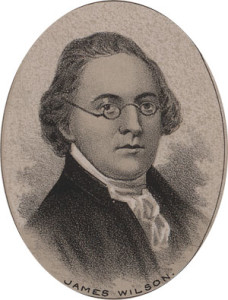
Scott: I think there are two really pivotal moments in the show for James Wilson, or at least for the way I’m playing him. His first big break with Dickinson is one; I spend a lot of the show nodding along or cheering him on. But then— and we’re going to talk a lot about Dan tonight apparently—when Dan gets up for “Molasses to Rum” and he’s really into it, Dickinson shows that he is very supportive of Rutledge at that moment. I (as Wilson) really don’t like that. It’s a very uncomfortable moment. And then afterward, the way that Dickinson treats Chase, it really inserts the first wedge between us. It’s not the straw that breaks the camel’s back but it’s the first straw leading to the pile-up that will eventually break the camel’s back. He’s looking at his mentor through new eyes for the first time. He’s been jarred out of just sort of following him blindly. Then there’s the moment at the end where Adams reminds him how important his decision is. He knows what to do, he’s been on the bench, but he has to snap out of it. That’s the final straw. Those are the two most important moments for him. Now, I was trying to think while giving that answer as to what defines the show for me personally, I’m not sure it’s either one of those moments. It’s probably “Molasses to Rum”. As a singer, it’s a role that I would love to take on some day. It’s just such a powerful song and a potent reminder of thee damning facts—no-one is innocent. And Dan is just laying it out and it’s relentless. It’s horrifying and we sit there on stage every day and take it all in, but it’s true. It’s just so powerful. I think it’s important to remember these things and not whitewash over them. It’s a very powerful moment in the show for me.
What has doing this show taught you about yourselves as performers? As human beings?
Andrew: There is the factoid of the show— the third scene being the longest scene in American Musical Theatre History without a song— it’s almost half an hour and we’re all there. It’s sort of like what I was talking about, realizing that I can sit in a scene like that and feel 95% of the time that I am staying directly in the scene. There are times when I’m going to be pulled away for a technical thing— in the back of my head there is little voice reminding me “you have to do this at this moment.” But that has really taught me a lot about what I can do as a performer. When you do musicals you’re used to doing five minute scenes. So to be able to do that sustained piece of acting, I hate to say it impresses me about myself, but I’m glad that I know that I can do it and that it’s there.
I mean I have not done a lot of straight plays in my history. The children’s show we’re doing at Toby’s right now is Diary of Anne Frank and we’re doing that in an abridged version. Whenever I do that show I find it as a chance to stretch my acting muscles, but even that is limited with the length of scenes. So the third scene in this show really stretches those acting muscles for me in a way that I just haven’t had the exposure to. Les Miserables is the most obvious example because you’re finding that different way of acting through the music. But you always have that in musicals, you always have to find the “why will your character sing?”
Also, I have not done anything in terms of acting in over a year. I haven’t been on stage since Les Miserables. So it’s nice to get out there and be reminded that “oh, I can do this.” Acting is a muscle. If you haven’t done it in a while, it can be a little scary to get back to it. I know it took me a lot longer to learn this show than it would have had I been doing shows on a regular basis. That part of my mind wasn’t quite up to speed, but it’s nice to see that I can still do it.
As a person, I’m not really sure what it’s taught me. I think it’s actually made me think a lot about how I deal with other people. As I said that’s what so much of this is in this show. Being away from acting I was away from people. I was with family out in California. When I came back I was sort of looking for work but I was also just figuring out what I was doing and there was a lot of solitude in that. So being back in this show has made me realize just how much I really missed being around people. I think in some ways Chase is alone in the show. He’s by himself, even just physically. I’m surrounded by people who are not on my side. The other three people who are sat at my table are pro-independence from the beginning. I have relationships to them but once we get into it, the division lines are pretty clear.
One thing I did with Chase early one was that I decided he was going to enjoy people. He has a good sense of humor. He enjoys Franklin immensely, even though he and Franklin are on opposite sides of the independence issue, he laughs at everything Franklin says. Even when Franklin is saying something that is against what Chase thinks, he just admires that wit. That is something that is very true of me. The people that I am most attracted to and enjoy being around are the people that I find funny. Funny and smart are the two most important traits a person can have in my opinion. Sometimes I think I don’t give everyone the benefit of understanding how funny they can be. And this is a very funny cast of people. It’s been a great experience for me, especially because of coming back the way I did. This is a great show to come back to.
Scott: Not to just quote the show and say “Ditto. Ditto,” but I agree with a lot of that. I think the active listening is something everyone is mentioning, and as we have said repeatedly tonight, it’s a great challenge and a great joy to be on stage and engaged the whole time without relying on the crutch of music, as I sometimes call it. I’ve learned a lot from that experience. As I said earlier, I love sitting and watching during rehearsals and now during the show, just observing and picking up on the little things that actors do. I’ve done a lot of that, nothing that I can quote specifically from the top of my head, but just learning from all of these great actors with their comedic timing and interactions on stage and their detailed characterizations. It’s been a wonderful learning experience.
I meant to say this earlier too! This is one of the differences between me and Wilson. I’m very passionate. And I smile a lot more. Wilson only ever gets to smile in a nervous way and when he’s laughing. I also laugh at Franklin’s jokes, even though they are often at my expense. I think everyone in congress loves Franklin. Even the characters that don’t like where he stands on independence.
Presumably everyone knows the way the show ends, given that it’s history, but there are actually moments throughout the production where audience members— myself included— have vocalized that they felt as if independence might not make it. What would you say has attributed to those tension driven moments?
Andrew: I think we’re just playing every moment as real as possible. We do not play the ending of it at all. That was actually something that came up a lot during rehearsals. You cannot play that ending. You have to be invested in the idea, whether we’re saying no or we’re saying yes. We don’t know what’s going to happen. We don’t know how the initial vote is going to go, we don’t know how the unanimity is going to go, we can’t know any of it. The fact that we’re playing the immediacy of that brings the audience into the reality of that. We don’t play the villains as villainous, we play the villains as people who have a passionate belief. For Dickinson and Rutledge this is simply what they believe. We play it real. We don’t play the idea of bad guys or good guys, we just play people. We believe it as we’re doing it so the audience doesn’t know how it’s going to go. People will say to me at intermission because I’m the Maryland guy, “Why aren’t you voting for this? Come on! Get on board!” And they’ve asked me, “What if they don’t win?”
Scott: Everything Andrew just said. He keeps taking my answers! But seriously, we’re real people living these moments with you. To loop back further, you’re part of it with us. In Wilson’s big moment everyone in congress’ eyes are on me but so are the eyes of everyone else in the audience. I can see everyone in the house who isn’t behind me staring at me. You guys in the audience are just as much a part of it as Livingston (Robert Livingston, played by Ben Lurye) who doesn’t speak outside of that one song. I don’t think there’s anything more that I can say. We’re living it in real time with you so we don’t know and you don’t know and it gets really exciting.
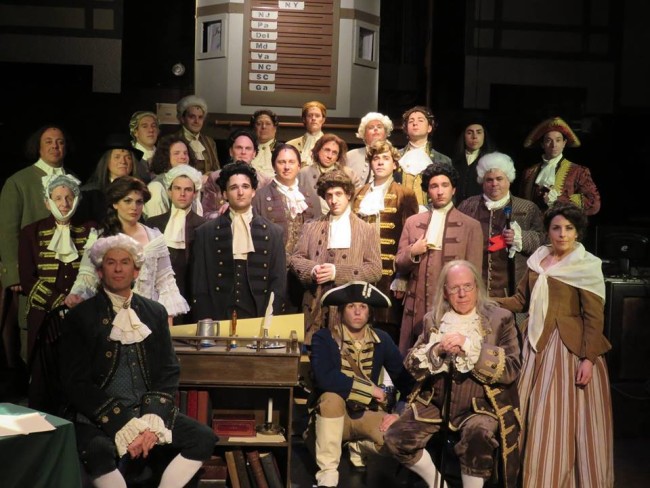
If you had to be a founding father, who would you be?
Andrew: Well the easy answer is Franklin. Everybody wants to be Franklin. He was funny. He was smart. He was passionate. Everybody loved him. Women loved him, apparently. And he loved women. That’s the easy answer. Otherwise, I’d have to say Adams. To me he’s the forgotten founding father. He isn’t as much anymore because of the great biography that came out a few years ago which was then turned into that TV miniseries. So he’s not as forgotten as he was. Of course when they wrote this musical that was the whole point behind it. They wanted to tell people about this guy. If it wasn’t for Adams we might not have had a revolution. There were plenty of people who wanted it but he was the one that pushed and you need that guy. Part of me would love to be that. I don’t think temperamentally I am him and I don’t think I could be, I’d be more of a Hancock (John Hancock, president of congress, played by Lawrence B. Munsey) in some ways. I tend to sit back and watch and then make a big decision based on what I’ve seen. Even to the point of saying “I believe this, but this is more important.”
Scott: Well, as a good UVA graduate I have to say Thomas Jefferson, the founder of our university. We revere him greatly. I love TJ—he’s a Renaissance man through and through. He did just about everything and he did it all pretty well and that’s pretty awesome.
If we could bring the founding fathers out of the past to Toby’s, what do you think they would have to say about the show and the experience?
Andrew: First they’d be looking at the little electric candles that we have at the tables and say “What?” It’s interesting because while I’d like to think that Franklin would love it— as he certainly enjoyed the theatre— I think Adams would be upset with the changes the script writers have made to history. He’s be blasting out “That wasn’t what happened!”
Scott: There would be a lot of upset from various people for whom history has been written or you know who the book writers did not treat very well, like Judge James Wilson, thank you very much.
Andrew: I think it would be very interesting to have them in the audience. I tend to think Jefferson would enjoy the show, he was into music. But I still think Adams might be a bit of a stick in the mud about things. I just get the impression from what I’ve read about him that although he could be joyful and absolutely love things, he tended be sort of dour about life. I don’t know if he would necessarily enjoy the show as a whole. I think he might enjoy the fact that he was the hero. I think it is true that he probably felt like he would never be remembered. And like I said that did sort of happen for a while. He’s the only one of the major founding fathers who isn’t on any money. And Franklin is! Franklin didn’t even become a president! And then you have people like Grover Cleveland creeping their faces onto money and Adams is on nothing. Adams should be on something. Hamilton just got his own Broadway blockbuster musical. Where is the John Adams love?
Scott: As I said, I think Judge Wilson and several of the others might be a little distraught at how they’re portrayed, either as cowardly and sort of a push-over, or less principled than what they were. Judge Wilson was actually writing these beautiful political treatises. He was one of a very small number of men who signed both the declaration and the constitution. He was later a Supreme Court Justice. As Franklin says in the show, these men are all the cream of the crop of their colonies. In a musical or a play like this you can’t focus on everybody and everybody can’t get the same treatment, but I think historically some of the founding fathers would be a little sad at the way they’re written.
Other than that I think they’d have a great time. I mean I really enjoy watching it every night, and twice on Wednesdays and Sundays. I can’t imagine why they wouldn’t.
Do you think the show still holds topical relevancy to modern audiences?
Andrew: I’ll tell you very specifically. The divide in the congress is so true to what is still going on today. The fact that you have to remember these are men— they are not political ideas, they are not demigods as Franklin says, they are men. And that’s true of our congressmen today. It’s so easy to look at history and say “these were the good guys and these were the bad guys.” But they weren’t. They were just men with different ideas. We can look back and say “oh that was right and that was wrong” but at the time they didn’t know that. Nobody there was saying, not even Dickinson was saying “we should never, ever split off from England.” He was just saying that if we were going to split off that it needed to be discussed and we needed to talk to them about it first. He was presenting an incredibly reasonable position. It’s so easy today to do exactly the same thing. “Oh look at the Republicans” or “Oh look at the Democrats” and just see them as puppets or cartoons who do good or who do bad. Or who do right and who do wrong.
What’s interesting to me is how some of the humor has changed. I’m not even talking about from 30 years ago I’m talking about from 10 years ago. I’ve seen productions from 10 years ago where certain jokes were getting laughs that we just aren’t getting today. And I’m not talking about with kids, I mean with adult audiences. A lot of it is just that we know different things now that we know then. Franklin, when this was written, was the most popular founding father and everyone knew everything about him. So the line where he gets introduced to Jefferson’s wife, “…Franklin, inventor of the stove?” That used to get a huge laugh. It doesn’t get a laugh anymore and I think that’s because people know Benjamin Franklin, but the fact that he invented the Franklin stove is really far from their heads now. We simply know different things than we did before in regards to these people. People know more about Adams now then in 1969 so it doesn’t come as a surprise that he’s this passionate guy. Everybody looking at it in 1969 was going “Wow! Who is this guy and why don’t I know about him?” He was the second president of the United States, so you would think everybody would have known about him but for a long time he was the forgotten one.
Scott: Andrew keeps stealing the thoughts out of my head and using different words to express them! I really think that modern audiences and modern politicians can really learn from a show like this, just how important it is to remember that the other sides of these issues are just that— they’re people. One of the great things that this show reminds us of id that we can all laugh at the same jokes, and make fun of each other, and give each other grief across all of the different political divides. That was something the founding fathers maintained and they were able to do something incredible with it. Because they related to each other as human beings they weren’t just talking about politics. They weren’t just facing ideas that they disagreed with, they were facing people who held the positions of those ideas. These were people who could reason, and people who could discuss. And they understood that they could still be civil or even be friends even though they disagreed on everything or on half of everything. There is still some value in recognizing humanity in each other and this show reminds people of that.
I’ve lived in DC for eight or nine years now and it’s so easy to forget, when you’re walking by the monuments or walking by the White House, that they’re there—we forget the importance and beauty of familiar things. A show like this helps remind you of the awesomeness that is a part of our history. It reminds us of the things we’ve overcome and that we’ve gone through to get where we are today. It helps us remember that we can overcome these great political divides and that we will overcome them. Not just that we can, but that we will and that we’ll move forward and grow together. It’s important to be snapped out of your everyday life and remember the majesty and the history. I try, every once in a while, actually look at the monuments. A show like this is very important in that regard. And to tie it back in with what I said earlier about the song, “Molasses to Rum”, it includes some horrible subject matter, but those things are true. We shouldn’t be whitewashing these things and there is real power in remembering our history and learning from it. It’s always going to be relevant and a show like this helps brings all sorts of different facets together to teach audiences.
What is it that you are hoping people will take away from seeing 1776?
Scott: Of course, as an egotistical actor, I want them to walk away thinking what a wonderful actor I am. But seriously, I think going back to the last question, I want people to be thinking about what we’re doing wrong today—we’re not talking to each other as people but instead we’re just talking about each other like we’re only ideas instead of complicated human beings. I want them to have a good time too.
Andrew: Sweet and to the point. And he stole my answer because I want them to think that I’m wonderful too. They’re going to remember me as the guy who got to eat during the show.
Scott: I’m actually really jealous of that—always hungry at that point in the show…
Andrew: Seriously though, I’d like them to go home with an appreciation for the idea that these were people. American history— the American Revolution was created by people. Yes they were immensely passionate and immensely smart people, but nevertheless, just people. I love Adams quote where he says “Franklin did this, Franklin did that, Franklin did some other damn thing. Franklin smote the ground and out sprang George Washington fully grown and on his horse. And the three of them, Washington, Franklin, and the horse, conducted the entire revolution.” I love that line so much because it is just so easy to believe that over-glorified version of history. It’s so easy to believe that these people had this one idea of independence and that it just happened. It was not that easy. I think that’s a wonderful thing and if this spurs interest in American history then that’s a great thing too! It ties right into the idea of what life and politics really are in this country.
Scott: What he said.
Andrew: Ditto. Ditto. I love it.
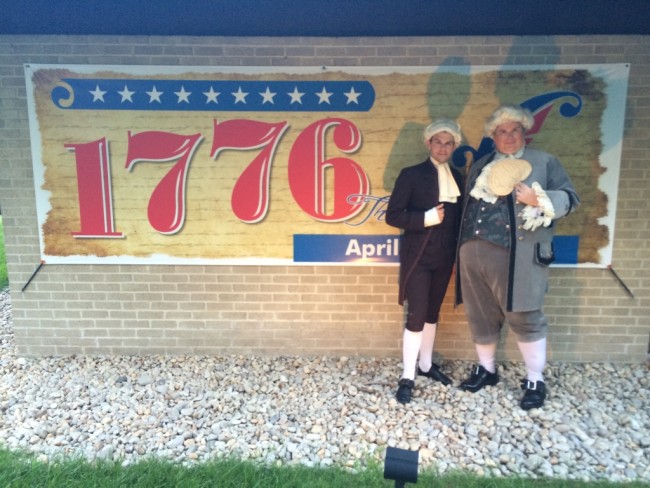
Why see 1776 at Toby’s Dinner Theatre of Columbia?
Andrew: Why Toby’s? Because first of all we have the intimate experience of in the round. It’s absolutely amazing to me. When I’ve seen shows there that I’m not a part of, it changes the show. It changes your life. From a purely financial standpoint? It’s a great deal. 50-some dollars and you get a great dinner and a great show. And parking. We actually used to make a big deal out of that— you get free on-site parking. If you go anywhere else in DC you’re paying for parking. But more than that— for this show they should come and see 1776 because it’s history right there. We’ve joked about this. It’s not the Hall of Presidents at Disney World. It’s not animatronics. It’s human beings doing history right before your eyes with real actors bringing history and humanity in that history to life. But in the round? Every minute we have to be in character because you are right next to us.
They had a great production at Ford’s Theatre. They had a great production at Olney. But those were productions. This here in the round right next to us? Suddenly this is more real. You’re not watching congress— you’re a fly on the wall in congress. You are actually in the congress.
Scott: Some of the audience members are practically at the tables with us.
Andrew: It brings an intimacy to this show that you can’t get anywhere else. There is just something about Toby’s— there is such immediacy to it. And it’s not like we play it small. We have plenty of small moments, everybody has small moments. But when we’re theatrical? We are there. You get all of it. It’s a full scale production with real moments in your lap.
Scott: What more could you want than a classic show well performed in a great venue? I love watching it every day. I love thinking about the show. I think audiences will enjoy it as well. We keep touching back on the same themes in this interview so they must be important, but this is such a powerful historical piece. It’s a great reminder of the greatness and the simplicity of these very real people. It’s a beautiful piece and everyone should come see it.
1776 plays through July 5, 2015 at Toby’s the Dinner Theatre of Columbia— 5900 Symphony Woods Road in Columbia, MD. For tickets please call (301) 596-6161 or purchase them online.
To read the review of 1776 click here.
To read Part 1 of Inside Independence Hall: An Interview with Co-Director Jeremy Scott Blaustein, click here.
To read Part 2 of Inside Independence Hall: An Interview with David James and Matthew Hirsh, click here.
To read Part 3 of Inside Independence Hall: An Interview with Russell Silber, click here.
To read Part 4 of Inside Independence Hall: An Interview with Dan Felton, click here.

